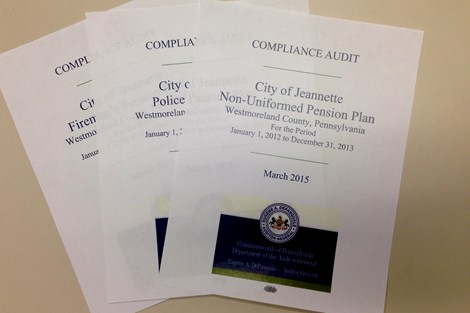Auditor General DePasquale Appalled by Declining Financial Condition of Pension Plans in City of Jeannette, Westmoreland County

Auditor General DePasquale Appalled by Declining Financial Condition of Pension Plans in City of Jeannette, Westmoreland County
Municipality boosted pension benefits, increased debt, missed payment, raised taxes
HARRISBURG (March 12, 2015) – Auditor General Eugene DePasquale said today that he is appalled that the City of Jeannette increased pension benefits to two of its three employee pension plans at a time when the Westmoreland County municipality fell $276,849 short of making its minimum municipal pension payment in 2013.
The increase in pension liabilities associated with the additional benefits to police and firefighters triggered a tax increase and caused the municipality’s pension funding levels to fall further into distress, according to the latest audit from DePasquale’s office of the city’s three municipal pension plans for police officers, firefighters and non-uniformed employees.
“It is breathtaking that even in a booming economy with robust stock market returns, Jeannette’s police and firefighter pension plans fell deeper into distress and debt, leaving the city unable to make its minimum municipal pension payment,” DePasquale said.
“As I told House Appropriations Committee members in Harrisburg on Tuesday, I will continue to sound the alarm about the growing problems with municipal pension plans across the state. Police, firefighters and non-uniformed employees in Jeannette — and communities large and small — are working toward their pension, but if we don’t work toward a comprehensive statewide solution, those pensions may be in jeopardy.”
In 2014, the City of Jeannette increased a special earned income tax dedicated to its pension fund from .15 to .50 percent to help pay for added police and firefighter benefits.
Police pension costs increased by $40,500 annually, and added $335,600 to the plan’s unfunded liability, when the city allowed police officers to collect a pension while continuing to work up to five years in a Deferred Retirement Option Plan. The city also has an ordinance that requires it to promote police officers to the next highest grade in rank for at least one month immediately prior to retirement.
“It is well-known that the last-minute promotions increase pension costs,” DePasquale said. “It is a practice known as ‘spiking’ and it must stop.”
The city fell $276,849 short of meeting its minimum police pension payment of $536,956 in 2013.
The police pension fund dropped from 66.3 percent funded in 2009 to 57.5 percent funded in 2013; the unfunded liability was $4.4 million in 2013.
In April 2014, the city increased the firefighters’ service increment benefit from $100 to a maximum of $500 per month for current and future firefighters. The city also granted a cost of living increase to members who retired after January 2012.
According to the audit, municipal leaders did not know the full impact of increasing firefighter benefits until a month later in May 2014 when a cost analysis determined that the enhanced benefit would increase costs by $25,000 annually and add $113,200 to the plan’s unfunded liability.
The firefighter pension fund fell from 67.6 percent funded in 2009 to 55 percent funded in 2013; the unfunded liability was $575,996 in 2013.
Pension plans that are between 50 and 69 percent funded are considered moderately distressed.
“One way to crawl out from under crushing financial liabilities is through sound planning and good decision making. We found neither in Jeannette,” DePasquale said, referring to modifying firefighter benefits without knowing the full impact. “The time to figure out if you can afford something is before you make the decision, not after.”
The minimum municipal pension payment obligation for the city’s three employee unions in 2013 was $832,173, including: police, $536,956; firefighter, $87,146; and non-uniform, $208,071.
There were no findings in the non-uniform pension fund audit. The non-uniform pension plan is 80.8 percent funded as of January 2013, up from 77.4 percent in 2009; the unfunded liability was $744,809 in 2013. Pension plans that are between 70 to 89 percent funded are considered minimally distressed.
In all, there are six findings between the police and firefighter audits:
• The police pension fund missed its minimum municipal obligation payment by $276,849 in 2013.
• There were two late filings for post-retirement reimbursements from the police fund which resulted in the loss of a $3,900 and $1,541 reimbursement.
• The firefighter pension fund had one late filing for post-retirement reimbursements which resulted in the loss of a $1,541 reimbursement.
• Both the police and firefighter pension plans had issues with implementing mandatory distressed provisions.
“The issues our auditors found in Jeannette are further proof that underfunded municipal pension plans are a problem in small towns and big cities across the state,” DePasquale said, noting that in January he released an updated statewide municipal pension report that puts the total unfunded liability for municipal pension plans across the state at $7.7 billion.
The report includes 13 recommendations that could be part of a comprehensive statewide effort to address the underfunding of municipal pension plans and the systemic issues associated with the administration of the plans.
The audit reports for the City of Jeannette’s three municipal pension plans are available online at:
# # #
Return to search results